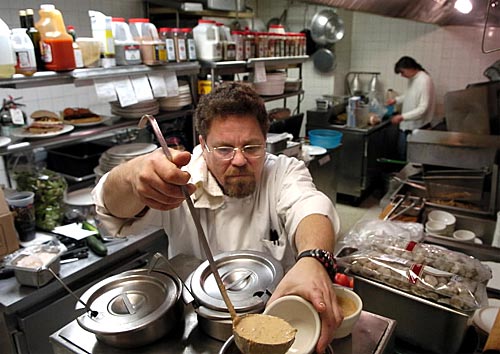 Clarence Hill
Clarence Hill Clarence Hill
Clarence HillClarence is a New Orleans' native who moved to the Baltimore area before Katrina and is co-owner of his own restaurant, "Clarence's Taste of New Orleans." The following article appeared in the Baltimore Sun on January 18, 200

By Justin Fenton
Sun reporter
January 18, 2006
Alone in the kitchen of his Edgewood restaurant, Clarence Hill is at home. He takes a handful of shrimp and tosses it into a skillet, then lays out a large piece of meat on the grill. He spins around and stirs a simmering pot of gumbo with a wooden spoon, then places a Cajun-style crab cake on the counter and yells for a waitress. "Pick it up!" he bellows.
In the dining area and dimly lit bar, Hill's six-week-old restaurant is bustling with an array of customers - a family of four, men and women in Army fatigues, a young couple sitting on the same side of a booth - who have come looking for an authentic New Orleans experience from the New Orleans-born co-owner/chef in this unlikely corner of Harford County.
After a chance encounter in Singapore a couple of years ago with a pair of fledgling restaurant entrepreneurs, Hill envisioned a restaurant of his own, one that would carry his name and free him from an itinerant career as a cook-for-hire.
But as he scouted locations in the Baltimore area, Hurricane Katrina deluged the Gulf Coast. His former home in the city's Ninth Ward, and the homes of many of his friends and family, were destroyed. His business plan took on a deeper meaning. The restaurant, a rare bit of spice in an area of otherwise generally bland suburban cuisine, would become a refuge for him - and an opportunity to honor his damaged hometown's rich culinary traditions.
"I watched the television for two weeks straight, because that's all I could do," recalled Hill, 42. "Once I established that most of the people who were a part of my life were OK, I began to think about the city and the fact that it's never going to be the same. The heart of the city has been hurt."
Located near several gas stations and a low-income housing development, Clarence's Taste of New Orleans sits in the middle of a MARC train station parking lot. The structure rattles gently when trains whiz past.
Hill's partners and financiers are Jim Havilan and Stacy St. John, a globe-trotting couple who recently settled 10 miles north of Bel Air in rural Street. They decided to take over a tavern on the edge of Aberdeen Proving Ground in hopes of transforming it from a military watering hole to a Cajun-style restaurant.
In New Orleans, officials have grappled with how best to celebrate next month's Mardi Gras, a signature holiday for the city. Some believe revelry may be the best way to rehabilitate the town's spirits as well as its coffers. Others wonder how anyone could be thinking about a party while much of the city lies in ruin.
For Hill, there is little choice: His restaurant is indelibly New Orleans, and the celebration is a key theme. The walls are painted purple, green and gold, and beads and feathers complement the personal photos displayed throughout. His Cajun food - and bayou roots - set his restaurant apart from the local offerings.
"We see a franchise in Clarence," Havilan explained in the restaurant's basement, where they have held a few group functions. "Unless you have a native of New Orleans, it's a taste that's tough to duplicate."
During the restaurant's recent Twelfth Night celebration - the start of the Carnival season - Rick and Mary Ross of Joppa slid around the bar to get a better view of Bourbon Street pianist and Hill's friend, David "D.R." Roe, as he growled through a jazzy rendition of "When You're Smiling."
"Have you tried the Cajun pasta?" Mary Ross, 51, asks. "Oh, my God, it's to die for!"
Hill seems genuinely surprised by the turnout as he works behind the scenes in the kitchen and Havilan and St. John work the bar.
"We're getting hit - this is a bit much," Hill says. "But what's important is how many come back."
A short, stocky man with thick glasses and a raspy voice, he was born in the Irish Channel neighborhood in New Orleans, one of six children of a single mother. He grew up in some of the poorer areas of southern Louisiana, in the rural towns of Bunkie and Cottonport, where about 40 percent of the residents live in poverty.
Turning 15 meant getting a job - in his case, as a dishwasher in a French Quarter restaurant called Coop's Place. He worked his way up to chef and later landed jobs at other area restaurants. Cooking has taken him to Singapore, Brussels, Belgium, and Kingston, Jamaica, in recent years, but he always found his way back home.
"You will never experience another place like New Orleans in the world," he said in his Creole accent. "There's a lot of good down there. They go the extra mile."
Growing up, Twelfth Night meant that in just a matter of weeks, he would be marching down Bourbon Street with the Krewe of Woo Hoo. They'd be clad in mystical costumes, dragging bead-studded coolers filled with beer.
Roe ducks outside the restaurant to puff on a hand-rolled cigarette. He said he's been getting calls all night from friends and family.
"I'm trying not to get too emotional, because back home this was a really important event," he said. "They're back there trying to make it happen, but it's not the same."
Though he did not endure the storm's devastation in person, Hill, like others with strong New Orleans ties, has been forced to cope while disconnected from those who were close to the tragedy. He has turned to work, taking on 12- to 14-hour days, six days a week at the restaurant.
Around midafternoon on a recent weekday, a man sidles up to the bar. The waitress notices the seal on his shirt - which indicates he assisted the Federal Emergency Management Agency in New Orleans - and points it out to Hill.
"You helped out with the cleanup?" Hill asks.
"Just got back. ... Terrible situation down there," the contractor says.
"I'm from New Orleans myself - Ninth Ward," he says.
"The Ninth Ward is gone," the contractor bluntly replies, shaking his head and picking at his food.
"Whole bunch of history there," Hill muses.
"Had a history," the contractor says.
No matter what struggle his hometown faces, Hill says he is focused, just like any other new business owner. Enticing local patrons to try something different and getting the word out are what keep him up at night.
"This is a tough market - it is," he said on his day off, thumbing through stacks of bills. "But we're finding it. We'll get there."
Copyright (c) 2006, The Baltimore Sun
HOME | UPDATES | DONATE | GALLERIES | PEOPLE | STORIES | LESSONS | LINKS